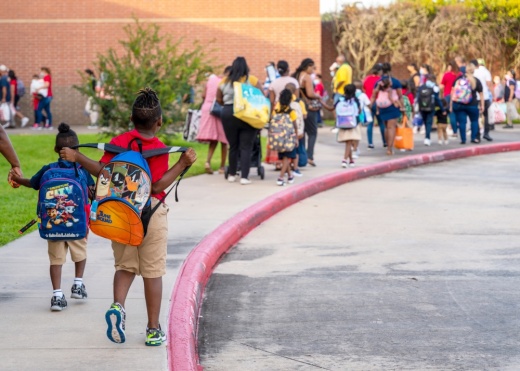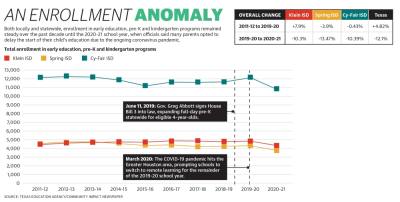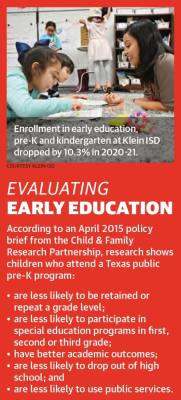Locally, Spring- and Klein-area school districts also experienced decreases in student enrollment in some of the earliest grade levels last school year, and officials said the trend is directly tied to the ongoing coronavirus pandemic.
“Parents who did not feel comfortable sending their students for in-person instruction may have also realized the limitations of trying to engage very young students in virtual learning,” said Sylvia Wood, chief communications officer for Spring ISD.
Between the 2019-20 and 2020-21 school years, student enrollment in early education programs, pre-K and kindergarten dropped by more than 500 students in both Klein and Spring ISDs and by more than 1,200 students in Cy-Fair ISD, according to TEA data. Similarly, enrollment at campuses such as the Grace England Early Childhood & Pre-K Center in KISD and Clark Primary School in SISD—which specialize in early childhood education—also dropped year over year by roughly 43% and 10%, respectively.
“In looking at our trends compared to the state trends, they were very much in alignment last year with seeing a decrease in enrollment in pre-K and in kinder[garten] [but] especially in pre-K,” said Dayna Hernandez, associate superintendent of communications and public relations for KISD.
However, experts such as Kristi Martin-Smith, the director of education and training for Children’s Lighthouse, said delaying the start of a child’s education could further exacerbate learning loss inflicted by the pandemic. The Fort Worth-based child care and early education company has two franchises in the Spring and Klein area.
“Delaying the start of a young child’s education can only be a pro if the child has a quality early learning environment where he/she can engage in exploring, develop creativity and a sense of inquiry, learn the skills needed to be part of a learning community and be around other children to learn positive social interactions,” she said. “This type of environment can be done at home, but it takes a fully engaged adult to scaffold learning.”
As the 2021-22 school year begins during the fourth wave of COVID-19, local school district officials said they are hoping to see enrollment in early education programs return to pre-pandemic levels.
Pre-K perks
The long-term benefits of effective early childhood education programs have been well documented, local educators said.
According to an April 2015 Policy Brief from the Child & Family Research Partnership, children who attend a Texas public pre-K program have better academic outcomes and are less likely to be retained or repeat a grade level, participate in special education programs, drop out of high school or use public services.
“Current brain research has established that 95% of a child’s learning foundation is laid during the first five years of their life,” Martin-Smith said. “The number of words a child hears during the preschool years are directly tied to how well they read around second grade—the more words, the higher the reading level.”
In addition to heightened literacy skills, Martin-Smith said children who enter kindergarten with positive emotional and interpersonal skills within a group of children have a greater chance of succeeding in school. These skills, she added, become increasingly challenging to develop in a virtual or home-school setting.
“Young children that are allowed to develop higher-level thinking skills through preschool activities ... develop healthy executive functioning skills ... [such as] memory, flexible thinking and self control, all of which are key to healthy, daily living and most of which are difficult to learn through remote learning or at home without a group of peers and the guidance from a trained early education professional,” Martin-Smith said.
Research also indicates early childhood education programs are particularly important for economically disadvantaged students, who make up roughly half of students in KISD and CFISD and more than 87% of SISD students, according to TEA data.
Similar research is part of what prompted the Texas Legislature to pass HB 3 in 2019, which mandated full-day pre-K programs for students who qualify in hopes of bridging the gap between economically disadvantaged 4-year-olds and their more affluent counterparts.
“Full-day pre-K provides opportunities for working families to access quality pre-K for their children,” said Bob Popinski, director of policy for Raise Your Hand Texas, an Austin-based public education advocacy group. “Especially after COVID, our early learners need the social and emotional support as well as the academic support our state’s early childhood programs can provide.”
While Texas school districts could apply for up to a six-year waiver to comply with the mandate, CFISD launched its full-day pre-K program in January 2020, followed by KISD and SISD in August 2020.
However, those who qualify for the state’s full-day pre-K program are limited to students who fall under certain categories, such as those who are low income or limited in English proficiency. Popinski said while HB 3 was a step in the right direction, there is still work to be done.
“Time and again, research proves that full-day pre-K gives all students a fair shot at success in school and life and will have long-term positive impacts on our state,” Popinski said. “Raise Your Hand believes that we need to continue to expand full-day pre-K programs so all families who choose to participate have access.”
Encouraging enrollment
Heading into the 2021-22 school year, local school district officials said they are optimistic pre-K and kindergarten enrollment will return to pre-pandemic levels without spiking.
In KISD, officials are projecting 4,613 pre-K and kindergarten students for the 2021-22 school year, up from 4,201 in 2020-21. Similarly, SISD officials are projecting 3,852 pre-K and kindergarten students, up from 3,675, and CFISD officials are projecting 11,065 pre-K and kindergarten students, up from 10,179.
“Our hope is that we’re going to level back out to where we were pre-pandemic,” Hernandez said.
To further bolster student enrollment, Hernandez said KISD began a pre-K and kindergarten roundup in April and extended KISD employees a tuition-based opportunity to send their own children—who would not normally qualify for full-day pre-K under HB 3—to pre-K in KISD.
Meanwhile, SISD will be implementing a new pre-K curriculum known as Frog Street this fall.
“In addition, the district is expanding its pre-K program to meet the needs of more students by offering a tuition-free option for 4-year-olds who don’t meet state eligibility requirements,” Wood said. “These seats will be awarded on a space-available basis.”
In CFISD, Leslie Francis, assistant superintendent for communications and community relations, said the district will enhance existing programs, such as extended-day tutoring and other programs that help with delayed learning due to the pandemic.
Although masks will be optional this school year at KISD and CFISD, SISD officials announced Aug. 10 that it would be implementing a mask mandate this year for students and staff.
The district’s decision is in defiance of Gov. Greg Abbott’s May 18 executive order that prohibits local government entities from mandating face masks. According to the order, entities that establish such mandates are subject to a fine of up to $1,000, although the order does not specify how the penalty would be applied to school districts. As of press time Aug. 18, the district’s mandate was still in effect and no action had been taken against SISD.
“Over the past week, I’ve received emails and phone calls, as well as in-person feedback from a variety of our constituents, regarding the health and safety of our students and staff,” SISD Superintendent Rodney Watson said at the Aug. 10 board meeting. “Starting Monday, Aug. 16, we will be mandating masks for all students and staff inside any SISD facility.”
All three school districts will continue performing hospital-grade disinfection of district facilities and providing hand sanitizing stations in 2021-22 to make families more comfortable about sending their children to school, officials said.
Wesley Gardner contributed to this report.







